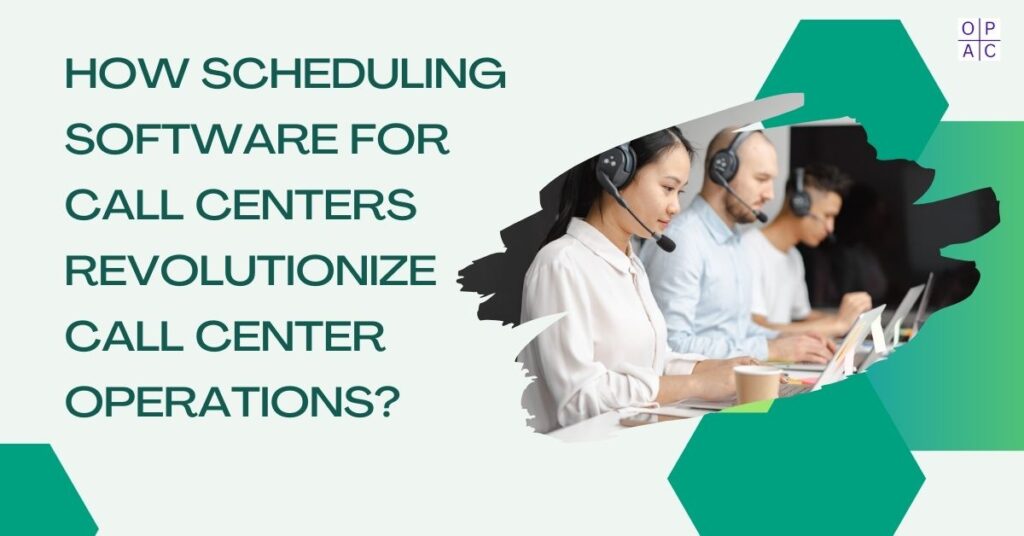Call Centers are the backbone of consumer service operations for numerous businesses. Their success heavily relies on maintaining optimal staffing levels, managing agent shifts, and ensuring efficient call handling.
However, achieving seamless scheduling in a dynamic call center environment can be a daunting task without the right tools. This is where scheduling software for call centers comes into play.
In this blog post, we will delve into the world of scheduling software for call centers, exploring its benefits, key features, and how it can revolutionize call center operations.
I. Understanding the Challenges of Call Center Scheduling
Before diving into the details of scheduling software, it is crucial to understand the challenges faced by call centers when it comes to managing schedules. These challenges include:
1. Complex Shift Patterns
Call centers often operate 24/7 and require managing multiple shift patterns, including day shifts, night shifts, and rotating shifts, to ensure round-the-clock coverage.
2. Agent Preferences and Availability
Accommodating agent preferences, time-off requests, and availability can be time-consuming and challenging to balance with operational needs.
3. Call Volume Fluctuations
Call volumes can vary significantly throughout the day, week, or month. Ensuring the right number of agents are scheduled to handle these fluctuations is crucial to maintaining service levels and customer satisfaction.
4. Compliance with Labor Laws
Call centers must adhere to labor laws, including break durations, maximum working hours, and overtime regulations. Violations can result in legal consequences and negatively impact employee morale.
Also Read: Top 5 Help Desk Software For Small Business
II. The Benefits of Scheduling Software for Call Centers

Scheduling software offers several advantages for call centers, enabling them to overcome the aforementioned challenges and streamline operations. Here are some key benefits:
1. Efficient Shift Planning
One of the primary advantages of scheduling software for call centers is its ability to provide efficient shift planning. With automated tools, call centers can create optimized shift plans that consider various factors such as call volume forecasts, agent availability, and skill sets. This ensures that the correct number of agents with the necessary skills are scheduled at any time.
By efficiently allocating resources, call centers can minimize overstaffing or understaffing issues, leading to improved productivity and cost savings.
2. Improved Agent Satisfaction
scheduling software for call centers plays a crucial role in enhancing agent satisfaction and engagement. It allows agents to indicate their preferences, submit time-off requests, and specify their availability through self-service portals. By empowering employees with these capabilities, scheduling software promotes a healthy work-life balance and reduces scheduling conflicts.
Agents have more control over their schedules, leading to increased job satisfaction, higher morale, and decreased turnover rates. As a result, call centers can build a more motivated and dedicated workforce.
3. Enhanced Customer Service
Another significant benefit of call center scheduling software is its impact on customer service. By optimizing staffing levels to match call volumes, the software ensures that there are enough agents available to handle incoming calls promptly. This leads to minimal wait times for customers and improved call-handling efficiency.
With the right number of agents equipped with the necessary skills, call centers can provide personalized and efficient customer service, resulting in higher customer satisfaction rates and improved service quality.
4. Compliance and Workforce Regulations
Scheduling software helps call centers stay compliant with labor laws and regulations. It automates various aspects of workforce management, including break times, maximum work hours, and overtime calculations.
By automating these processes, call centers can ensure that they adhere to legal requirements and maintain a fair working environment. Scheduling software also generates accurate reports and records, which can be essential in demonstrating compliance during audits or legal proceedings.
By reducing the risk of legal issues and penalties, call centers can operate with confidence and focus on delivering exceptional customer service.
Overall, scheduling software brings numerous benefits to call centers, ranging from improved efficiency and agent satisfaction to enhanced customer service and compliance with workforce regulations.
By leveraging the power of automation and optimization, call centers can streamline their operations, achieve better outcomes, and create a positive working environment for their agents.
Also Read: Top 10 Paperless Board Meetings Software
III. Key Features to Consider in Scheduling Software for Call Centers
When selecting scheduling software for a call center, certain key features should be considered to ensure optimal functionality and effectiveness. These features include:
1. Forecasting and Demand Analysis
Advanced scheduling software incorporates forecasting capabilities to predict call volumes and staff requirements accurately. This helps in creating optimized schedules that align with demand fluctuations.
2. Skill-Based Routing and Scheduling
Effective scheduling software allows call centers to match agents with specific skills to appropriate calls. This feature ensures that customers are directed to the most qualified agents, resulting in improved first-call resolution rates and customer satisfaction.
3. Real-Time Monitoring and Adherence
Real-time monitoring enables supervisors to track agent performance and adherence to schedules. It helps identify any deviations and take prompt action to maintain service levels.
4. Automated Schedule Generation
Scheduling software for call centers should have the ability to generate schedules automatically based on predefined rules, agent preferences, and business requirements. This saves time and eliminates manual errors.
5. Self-Service
Self-service portals empower agents to view their schedules, request time off, swap shifts, and update their availability. This feature reduces administrative overhead and increases agent engagement.
6. Reporting and Analytics
Robust reporting and analytics capabilities enable call center managers to analyze scheduling data, identify trends, and make informed decisions. Reports on agent performance, adherence, and schedule efficiency help drive continuous improvement.
IV. Implementing Scheduling Software: Best Practices
To ensure a successful implementation of scheduling software, call centers should consider the following best practices:
1. Clearly Define Business Requirements
Clearly articulate the specific needs and goals of the call center, including shift patterns, labor regulations, and service level targets. This will help in selecting the most appropriate scheduling software for call centers.
2. Involve Key Stakeholders
Involve call center supervisors, agents, and HR personnel in the software selection and implementation process. Their input and feedback are invaluable in ensuring the software meets their needs and expectations.
3. Provide Adequate Training and Support
Offer comprehensive training to managers, supervisors, and agents on how to use the scheduling software effectively. Provide ongoing support and resources to address any questions or issues that may arise.
4. Regularly Review and Optimize
Continuously monitor and evaluate the performance of the scheduling software. Analyze key metrics, seek feedback from users, and make adjustments as needed to maximize efficiency and effectiveness.
Final Thoughts - Scheduling Software for Call Centers
Scheduling software plays a vital role in optimizing call center operations, enabling efficient shift planning, enhancing agent satisfaction, improving customer service, and ensuring compliance with labor laws.
By embracing scheduling software for call centers, call centers can revolutionize their operations, streamline scheduling processes, and achieve higher productivity. Investing in the right scheduling software solution tailored to the specific needs of a call center is a strategic move that will yield significant benefits in the long run.
Embrace the power of scheduling software and propel your call center toward operational excellence and customer satisfaction.
Frequently Asked Questions
1. What is workforce management software?
Workforce management software is a tool designed to help businesses efficiently manage their workforce, particularly in call centers.
It assists in tasks such as scheduling employees, tracking attendance, optimizing staffing levels, and managing labor costs.
2. Why is workforce management software important for call centers?
Workforce management software is crucial for call centers because it enables efficient scheduling and optimization of call center agents. It helps ensure the right number of agents are available to handle customer calls, minimizing wait times and improving customer service.
Additionally, it assists in managing labor costs and tracking employee attendance.
3. How can workforce management software help with the scheduling process?
Workforce management software simplifies and streamlines the scheduling process for call center employees. With features like drag-and-drop scheduling, managers can easily create and modify schedules based on agent availability and call volume.
This saves time, reduces errors, and improves overall scheduling efficiency.
4. What are the benefits of using employee scheduling software in a call center?
Employee scheduling software offers several advantages for call centers. It helps ensure optimal staffing levels, improves agent productivity, reduces scheduling conflicts, and enhances employee satisfaction.
By automating the scheduling process, it eliminates manual errors and provides a more accurate and efficient way to manage call center schedules.
5. Can workforce management software track employee availability?
Yes, most workforce management software solutions include features to track employee availability. Managers can input and manage agents’ availability preferences, time-off requests, and other scheduling constraints.
The software then considers this information when generating schedules, ensuring that shifts are assigned based on employee availability.
6. How does workforce management software help in tracking attendance?
Workforce management software offers attendance tracking functionality for call center employees. It allows managers to record and monitor employee attendance, and track late arrivals, early departures, and other attendance-related metrics.
This data can help identify patterns, address attendance issues, and ensure compliance with company policies.
7. What should I look for in the best call center workforce management software?
When choosing workforce management software for call centers, it is important to consider features like drag-and-drop scheduling, robust employee scheduling capabilities, accurate forecasting and scheduling based on call volume, real-time monitoring, and reporting, integration with other call center systems, and user-friendly interfaces.
Additionally, it should provide effective labor cost management tools and accommodate the specific needs of your call center operations.
Share







